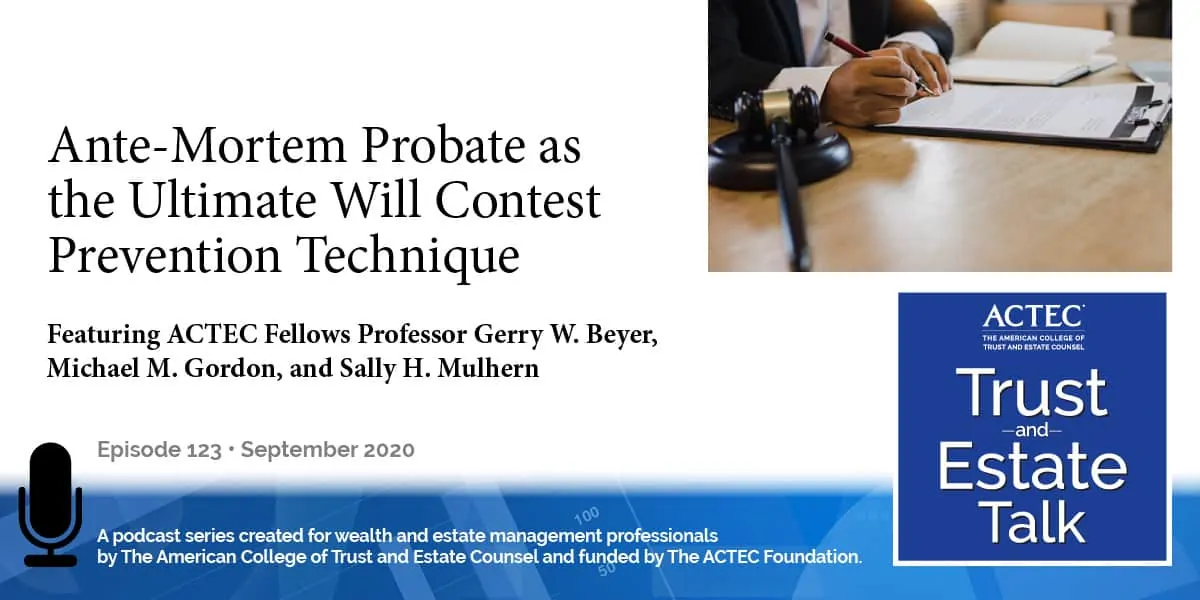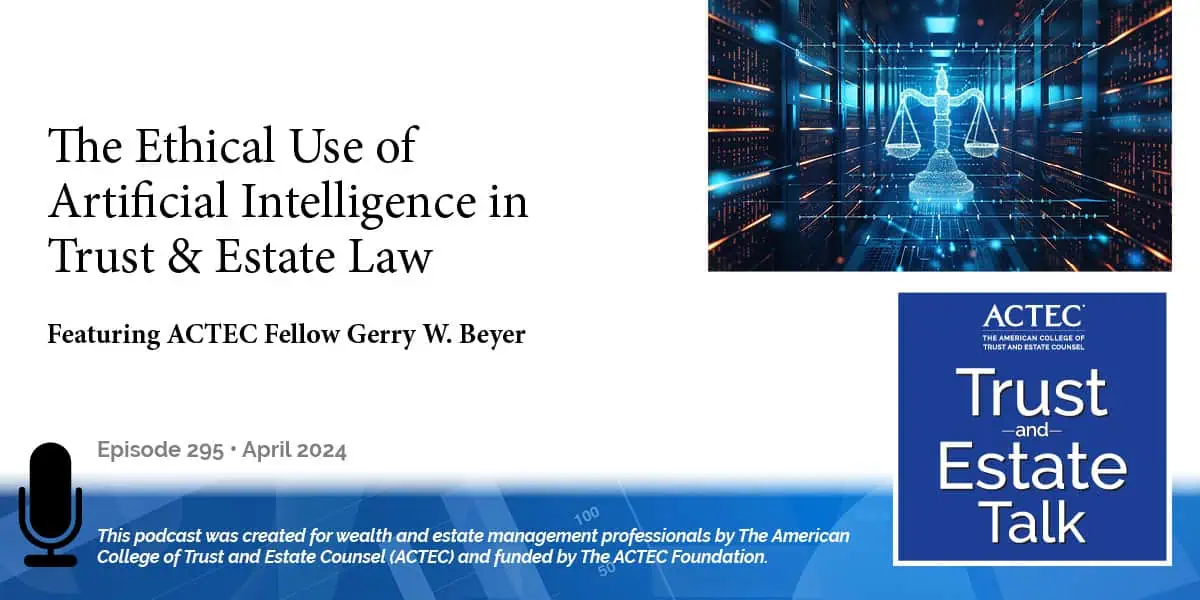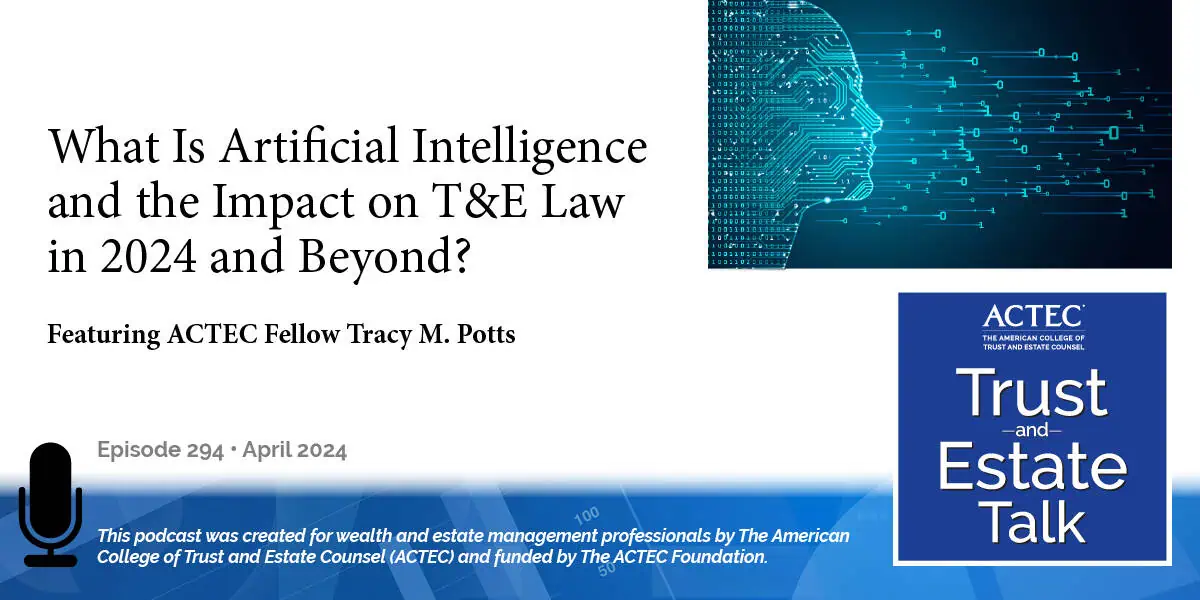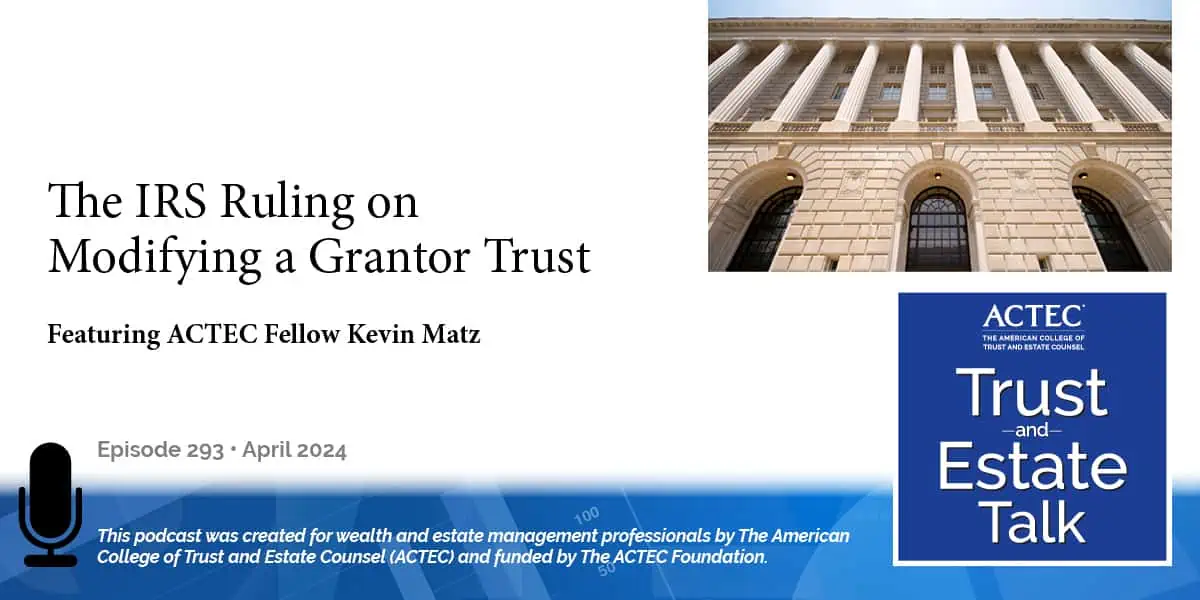Ante-Mortem Probate as the Ultimate Will Contest Prevention Technique

“Ante-Mortem Probate as the Ultimate Will Contest Prevention Technique,” that is the subject of today’s ACTEC Trust and Estate Talk.
Transcript/Show Notes
This is Stacy Singer, ACTEC Fellow from Chicago. Ante-mortem probate proceedings are becoming more common as the ultimate will contest prevention technique. To give us more information on this trend, you will be hearing today from ACTEC Fellows, Professor Gerry Beyer of Lubbock, Texas; Michael Gordon of Wilmington, Delaware; and Sally Mulhern of Portsmouth, New Hampshire. Welcome everyone.
Some of you may remember being in law school and maybe having this type of question on your exam — under the rules of evidence, the court will permit the testator to testify regarding his or her intent and capacity during the probate of the will. And, of course, you know that couldn’t be because the testator is already deceased, but that is not the case in the nine states which permit pre-death or ante-mortem probate; and in some states, it has been expanded to other estate planning documents such as inter vivos trusts and powers of appointment.
You are surely familiar with a wide variety of will contest prevention techniques such as in terrorem provisions or recording will execution ceremonies, things like that, but all of them have a fatal flaw. They are not a 100 percent guarantee. We do, though, have a perfect solution to that and that is premortem or ante-mortem validation of a will, inter vivos trust, and even in some states, a power of appointment. So, you get a court order, a declaratory judgment for example, while the testator is alive; and once the time to appeal has run, it is thus then too late to have a contest.
Premortem Probate
There has been a long and varied history of premortem probate in the United States. One of the things that is very interesting is that when the drafters of the Uniform Probate Code were drafting, they seriously considered an Ante-mortem Probate of Wills Act, a uniform act. And although the commissioners were all in favor of premortem probate, they were unable to determine and agree on what type of statute to use. They were evenly divided and so they canceled the addition of premortem probate into the Uniform Probate Code, so they could move forward with this huge project with intestacy wills, estate administration and so on.
So how has ante-mortem probate evolved in the United States? The original three states, North Dakota in 1977, Ohio in 1978, and Arkansas in 1979 were the leaders, and then for about 31 years, no states enacted premortem probate. In 2010, there was a big resurgence and since then we have had other states: Alaska, 2010; New Hampshire, 2014; Delaware, 2015; North Carolina, in 2015; as well as two states that have very primitive statutes, including the validation of wills in their declaratory judgment statutes, that being Nevada and South Dakota.
All right, we will now pass it on to Michael who is going to tell us about when this technique is especially useful.
Ante-mortem Probate
Thank you, Gerry. I am going to discuss the typical fact pattern that we normally see when we have a client that is interested in using one of the ante-mortem probate statutes. The most typical fact pattern that we see is one in which the estate plan is being constructed to have a disproportionate distribution of assets among the children. So, as a result of a fractured relationship, perhaps with one or more of the children, mom and dad have decided to leave their estate planning documents in such a fashion so as to disinherit or lessen the amount that certain children or family branches will receive. As a result of this disproportionate distribution of assets among the beneficiaries, mom and dad are concerned that there is going to be a contest upon their passing. They are worried that those beneficiaries that are being disinherited or are receiving a lesser amount of the estate will file an action, when mom and dad pass away, to contest the validity of the estate planning documents at issue.
Clients that are interested or fall within this category, I should say, really are going through the ante-mortem probate process for two reasons. Number one, many of these clients anticipate that although their children will likely contest the validity of the estate planning documents when they are dead, they do not think the children will come forward when they are alive — to contest the validity of the estate-planning documents — because they do not think the kids have the gumption to come forward and say that mom and dad lack capacity, or mom and dad, you are being unduly influenced by our sisters. As a result, they choose to go through this process because if the beneficiary does not come forward within the statutorily designated period, they know that their estate planning documents will be valid.
The second reason that these clients are interested in utilizing the ante-mortem probate process is that they very well may anticipate that their children will indeed contest the validity of the estate planning documents while they are alive; but they want the opportunity to face not only their children but also testify in the court that would have jurisdiction over the matter, to explain the reasons why they constructed the estate planning documents the way that they did. They have full capacity, they are not being unduly influenced, and there are reasons why they have put the documents in place in a particular fashion. So, they want to be that star witness that can explain why things were done the way that they were.
The second category of clients are those that maybe aren’t having a disproportionate distribution of assets among the beneficiaries but anticipate that there will be a surprise when they pass away, based on the construction of the estate planning documents. For example, you may have a situation where the vast majority of the assets are passing to a charity and the beneficiaries are unaware of that and the grantor is concerned that those beneficiaries will come forward and try to challenge the documents in hopes of settling with the charity and receiving some of the assets when the grantor passes away. The grantor wants to preclude that possibility by going through the ante-mortem probate proceeding while he or she is alive. So, with that I will turn things over to Sally to explain the process in New Hampshire.
Settlor Intent & Premortem Probate
Thank you so much. It has really been an honor to work with you on this topic. I think it is such an important topic and I started the process in New Hampshire in 2009. And a lot of people say, you know, “What prompted you?” “Why did you want to get involved with this?” And I could see the dark clouds on the horizon in terms of the increase of – in trust and estates litigation; and I am so committed, as we all are at ACTEC, to focusing on settlor intent that I saw that there was a possibility of settlor intent being undermined through increased litigation at the time that a client passed away. It has also occurred to me that a no contest clause really would help in a situation where a beneficiary, as you said, Michael – has no teeth. And it also occurred to me that if we did lifetime approval, we could have the best evidence rule in place because the testator would still be alive.
I had the good fortune, Gerry, of connecting with you because you had such a strong history in the lifetime approval process and gave me wonderful insight in terms of how do we go about drafting the litigation, which in our state is a “notice” type of approach. We get the document signed, send them into the courts, send notice to everyone who could be interested and say, “Hey, if you have a problem with this, show up at this time.” And the burden of proof is that we assume that the testator is competent and that there was an absence of undue influence. It took about five years to get through. I think the advantages were to get input from key trusts and estates practitioners, the bench, the Bankers’ Association, and other influencers. What have we learned, Dorothy? But, suffice it to say, in my eyes it has been extremely valuable and successful. It is not a panacea. It does not solve every situation, but we all know those cases that are going to blow up, and it is better to deal with it while the client is still alive.
Thank you all and thank you for giving us such a great tutorial on ante-mortem probate proceedings.
This podcast was produced by The American College of Trust and Estate Counsel, ACTEC. Listeners, including professionals, should under no circumstances rely upon this information as a substitute for their own research or for obtaining specific legal or tax advice from their own counsel. The material in this podcast is for information purposes only and is not intended to and should not be treated as legal advice or tax advice. The views expressed are those of speakers as of the date noted and not necessarily those of ACTEC or any speaker’s employer or firm. The information, opinions, and recommendations presented in this Podcast are for general information only and any reliance on the information provided in this Podcast is done at your own risk. The entire contents and design of this Podcast, are the property of ACTEC, or used by ACTEC with permission, and are protected under U.S. and international copyright and trademark laws. Except as otherwise provided herein, users of this Podcast may save and use information contained in the Podcast only for personal or other non-commercial, educational purposes. No other use, including, without limitation, reproduction, retransmission or editing, of this Podcast may be made without the prior written permission of The American College of Trust and Estate Counsel.
If you have ideas for a future ACTEC Trust & Estate Talk topic, please contact us at ACTECpodcast@ACTEC.org.
© 2018 – 2024 The American College of Trust and Estate Counsel. All rights reserved.
Latest ACTEC Trust and Estate Talk Podcasts

The Ethical Use of Artificial Intelligence in Trust & Estate Law
A law professor offers insights into the risks, rewards, duties and ethical considerations of lawyers using AI in their T&E practices.

What Is Artificial Intelligence and the Impact on T&E Law in 2024 and Beyond?
A primer on the types and uses of AI, then a deeper dive into the impact on trust and estate law from types to applications to ethical considerations.

The IRS Ruling on Modifying a Grantor Trust
Explore the gift tax implications for trust beneficiaries modifying grantor trusts in IRS CCA 202352018, with nuanced analysis and estate planning insights.

